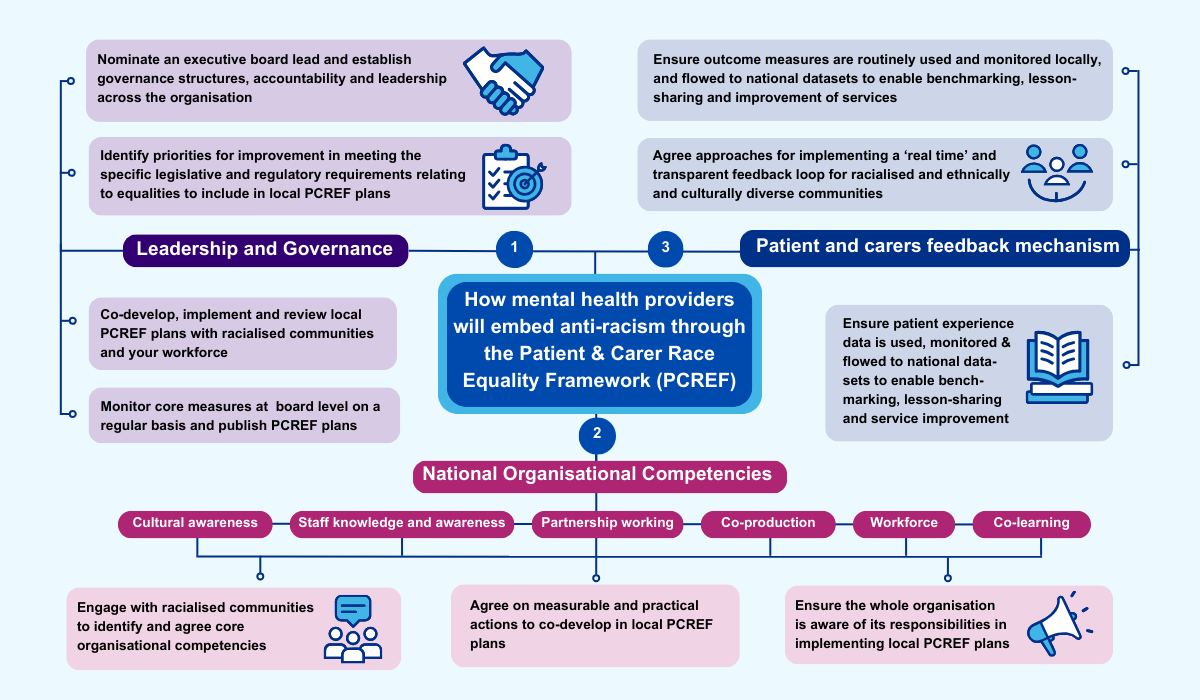Patient and carer race equality framework
NHS England has launched its first ever anti-racism framework: the Patient and carer race equality framework (PCREF), for all NHS mental health trusts and mental health service providers to embed across England. This mandatory framework will support trusts and providers on their journeys to becoming actively anti-racist organisations by ensuring that they are responsible for co-producing and implementing concrete actions to reduce racial inequalities within their services. It will become part of Care Quality Commission (CQC) inspections. The PCREF will support improvement in three main domains:
- Leadership and governance: trusts’ boards will be leading on establishing and monitoring concrete plans of action to reduce health inequalities
- Data: new data set on improvements in reducing health inequalities will need to be published, as well as details on ethnicity in all existing core data sets.
- Feedback mechanisms: visible and effective ways for patients and carers to feedback will be established, as well as clear processes to act and report on that feedback.
The anti-racism framework brings ground-breaking change to the sector, building on progress achieved locally, and promoting a whole new dimension of coproduction, where individuals and communities are at the heart of the design and implementation of the services they need.
How trusts will embed anti-racism through the patient and carer race equality framework (PCREF)
Leadership and governance
- Nominate an executive board lead and establish governance structures, accountability and leadership across the organisation.
- Co-develop, implement and review local PCREF plans with racialised communities and your workforce.
- Identify priorities for improvement in meeting the specific legislative and regulatory requirements relating to equalities to include in local PCREF plans.
- Monitor core measures at Trust Board level on a regular basis and publish PCREF plans.
National organisational competencies
- Engage with racialised communities to identify and agree core organisational competencies.
- Agree on measurable and practical actions to co- develop in local PCREF plans.
- Ensure the whole organisation is aware of its responsibilities in implementing local PCREF plans.
Patient and carer feedback mechanism
- Ensure patient experience data is used, monitored and flowed to national data-sets to enable bench- marking, lesson-sharing and service improvement.
- Ensure outcome measures are routinely used and monitored locally, and flowed to national datasets to enable benchmarking, lesson-sharing and improvement of services.
- Agree approaches for implementing a ‘real time’ and transparent feedback loop for racialised and ethnically and culturally diverse communities.
Pilot trusts
Since 2020 NHS England has been working with four mental health trusts (listed below) to pilot the PCREF across the country:
- Greater Manchester Mental health NHS Foundation Trust
- Birmingham and Solihull Mental Health NHS Foundation Trust
- South London and Maudsley NHS Foundation Trust
- East London NHS Foundation Trust
A further six early adopters followed a year later, ahead of the national roll out in 2023.
These trusts have worked with minority-led voluntary, community, social enterprise (VCSE) organisations, patients, and carers to ensure the community voice is embedded in their approach in order to strengthen the work of the PCREF. The learnings from the work of the pilot trusts have been used to inform the development of the launch of the PCREF nationally.
Video created by Young Creators UK.
Background
The COVID-19 pandemic highlighted the grim reality of health inequalities across the country – but for the mental health sector this has been a long-term trend marked by decades of stigma, rejection, and racism. Ethnically and culturally diverse groups are still facing barriers to access, and their experience of services is likely to be worse than for the rest of the population. We know that despite higher prevalence of mental health issues, Black adults for instance have the lowest mental health treatment rate of any ethnic group, at 6% (compared to 13% in the White British group).
NHS England has led the development of the mandatory anti-racism framework with key national and local partners and will monitor its implementation across Mental Health Trusts. It will bring more transparency and accountability to the mental health sector, with the ambition to put an end to race inequalities while truly committing to workforce diversity, coproduction, and equity.
The anti-racism framework is a core part of the Advancing Mental Health Equalities strategy. It was also a key recommendation of the Independent Review of the Mental Health Act 2018 that NHS England agreed to take forward. The development of the PCREF is being overseen by NHSE’s PCREF Steering Group and Advancing Mental Health Equalities Taskforce, established in February 2020. Both are chaired by Dr Jacqui Dyer, NHS England’s Mental Health Equalities Advisor.
To accompany the launch of the anti-racism framework, a library of positive practice case studies, patient and carer stories, and useful resources to support Trusts in their journey to becoming an anti-racist organisation, has been complied and is available on the Future NHS Collaboration platform.
To find out more about the practical steps mental health trusts needs to take to embed the anti-racism framework please see the fully published PCREF document.
Blogs
 Dr Jacqui Dyer, Mental Health Equalities Advisor
Dr Jacqui Dyer, Mental Health Equalities Advisor
Launching the Patient and carer race equality framework for mental health trusts and providers
Erk Gunce, Expert by Experience in our Mental Health team
Patient and carer race equality framework: making decisions with communities, not for them

